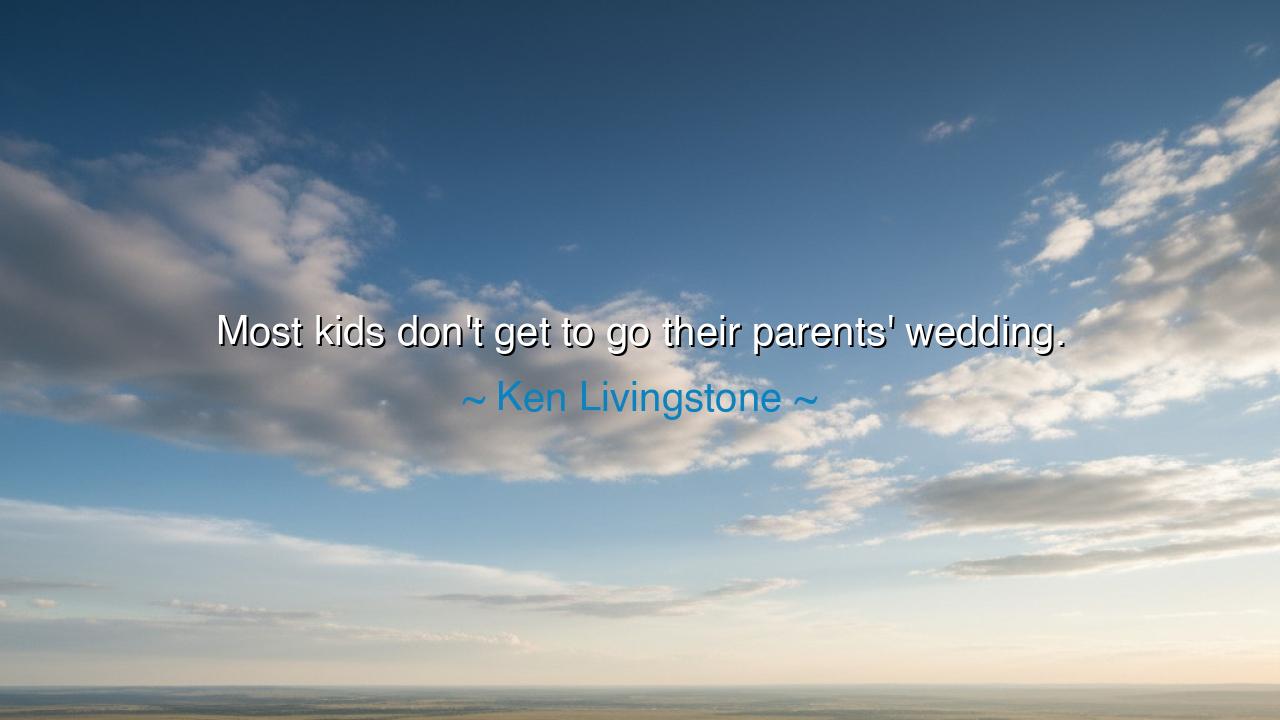
Most kids don't get to go their parents' wedding.






In the words of Ken Livingstone—“Most kids don’t get to go their parents’ wedding.”—we are struck by a truth at once humorous and profound. For though a wedding is the beginning of a family’s story, the children who are born from that union cannot stand as witnesses to its first covenant. The child arrives after, living within the house built by vows but never seeing the moment when the foundation was laid. Thus, Livingstone speaks to the mystery of origins: we dwell in the fruit, but not the planting.
The ancients often pondered this distance between beginnings and those who come after. Consider the founding of Rome: Romulus and Remus grew into men, but they never saw the union of their parents, the vestal Rhea Silvia and the god Mars. Their lives were shaped by a story told, not a moment seen. So too do children grow within the unseen consequences of vows, inheriting the blessings or the burdens of promises spoken before their birth. The wedding is therefore both theirs and not theirs—an invisible root that nourishes the visible tree.
Livingstone’s words also carry an irony: that sometimes, in rare cases, children do attend the weddings of their parents, when vows are delayed, renewed, or spoken anew. In such moments, they witness what most cannot—the union that shapes their existence. It is a reminder that families are not static, but living, changing, binding themselves again when love demands. The child who sees such a moment gains a rare gift: the sight of love made tangible, not merely inherited through story.
The saying also challenges us to reflect upon how much of life is inherited unseen. Just as children cannot attend their parents’ wedding, so too do they not witness the struggles, the sacrifices, the countless unseen acts of love that uphold the family they are born into. They live amidst the fruits of choices, yet do not see the labor of planting. To recognize this is to awaken gratitude, to honor not only the stories told, but the hidden foundations upon which we stand.
Thus, the wisdom endures: much of what gives us life remains unseen, hidden in the vows, struggles, and sacrifices of those who came before. Do not take lightly the house you are born into, nor the unseen wedding that began it. For though you may not have been present at its dawn, you are its living proof, the legacy of a covenant that gave you breath.






KDNguyen Cao Khanhd Duy
Ken Livingstone’s comment really got me thinking about the dynamics of family celebrations. It’s true that kids don’t typically attend their parents' wedding, but that leaves a gap in shared memories. I wonder if it would be more inclusive and meaningful to have children be part of such a significant event. Do you think kids should be allowed to participate in their parents' weddings, or does that take away from the intimacy of the occasion?
BLNguyen Tran Bao Linh
It’s fascinating how Ken Livingstone’s comment sheds light on the fact that most kids don’t get to attend their parents' wedding. I’ve always wondered how that might shape their view of marriage or family. Could it be that children miss out on an important family tradition, or is it better to keep the event more private and adult-focused? What are your thoughts on children attending weddings?
ATAn Tran
Ken Livingstone's point about kids not being at their parents' weddings is a bit of a sad truth. Weddings are such a significant event, and it’s a shame that children often don’t get to be part of it. There are probably many reasons for this, like the formality or logistics, but could there be ways to include children without disrupting the flow of the event? How do you feel about children at weddings?
DNPham Duy Nam
This quote by Ken Livingstone highlights a simple truth: kids are rarely part of their parents' weddings. It’s interesting because weddings are such a pivotal event in many people’s lives, yet children are often too young to participate or even attend. Do you think there’s a missed opportunity in not involving children more in these family milestones? Could their presence add something special to the ceremony?
LTlinh Trieu
Ken Livingstone’s comment is an interesting reflection on how children are often excluded from their parents' weddings. It’s true that weddings are typically adult-focused events, often due to the complexity or formality of the ceremony. But I can’t help but wonder if children being involved might bring a whole new level of meaning to the event. Do you think children should be included in weddings, or should they remain separate from such occasions?